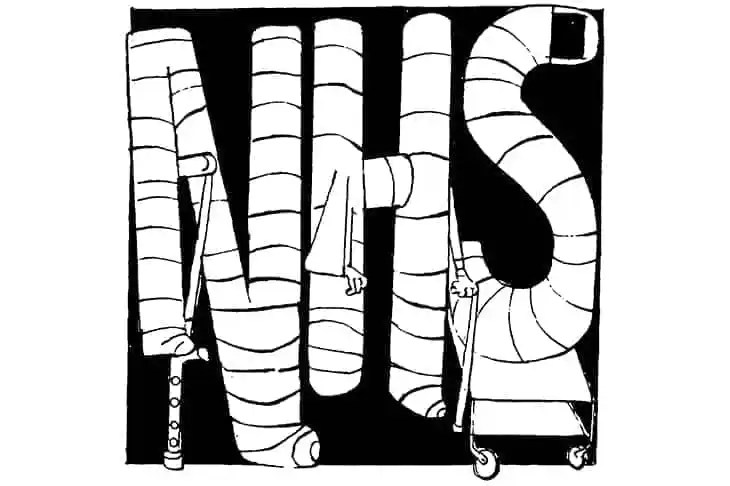The NHS is struggling to cope with an ageing population. Disputes over pay have created a stand off between doctors and the government, while the crumbling social care system has seen bed-blocking reach record levels. So far, the suggested fixes have usually been calls for more money. But what about tech? That’s Health Secretary Steve Barclay’s big idea.
Speaking to a large audience at The Spectator’s event ‘Can AI and innovation save the NHS?’ this afternoon, Barclay outlined why introducing AI into the health service is right. Chaired by The Spectator’s assistant editor Isabel Hardman, Barclay was joined on the stage by Dr Sandesh Gulhane MSP, shadow Scottish cabinet secretary for health and social care, Simon Denegri, executive director of the Academy of Medical Sciences, Katherine Holden, head of AI at TechUK and Richard Torbett, CEO of event sponsors ABPI.
Can the government convince voters that – with AI – it has an exciting vision for the future of the UK’s health service?
Could AI help solve the NHS’s workforce crisis? Perhaps, by ‘enabling, not replacing’ the workers, Barclay hastily clarified, ‘because that’s the way, certainly for now, that I see AI has the most active role to play.’ Barclay is adamant that AI could help by handing ‘non-clinical tasks’, for example administrative ward work.
Efficiency is what Barclay’s vision is all about. The overarching theme of the Health Secretary’s speech was how quickly patients are treated: to push people through the service faster and tackle expanding wait lists. Barclay believes technological innovation needs to hit the ‘sweet spot’ of ‘getting early care to patients’, while delivering a service that works faster and improve disease prevention. The panel were generally in agreement that AI presents not a threat to the UK’s health service, but an opportunity. It could help rapidly treat strokes and scale up screening programmes, and help with procurement and management. Would this come at the cost of quality healthcare?
On budgets, the Health Secretary deferred to his own experience in the Treasury. Barclay referred to Chancellor Jeremy Hunt’s comments this week about pressure on capital budgets for the health service, ‘principally because there’s often a need to respond to pay pressure. And of course that’s a very live issue at the moment given the industrial action that we face.’
And while Barclay didn’t shy away from talking about workforce, he was brief on the subject. It is after all an issue that, had it not been mentioned, might have been a rather large elephant in the room given Barclay’s troubles with the doctors’ unions – whose members were, that afternoon protesting outside the conference centre. Barclay expanded on a topic he’d briefly discussed yesterday evening: making changes to training programmes for healthcare workers to ‘make the NHS more vocational’. Reading between the lines, Barclay appears to be hinting at a marked government shift towards favouring associated healthcare workers, for example physician’s associates. This is likely to go down well with doctors who already feel undervalued by the government – the relatively new PA role has caused a lot of controversy, while whole Reddit threads exist to berate the increasing powers of ‘noctors’.
Barclay’s argument is that there needs to be ‘more opportunities for people to take on advanced roles, not to be confined by where they were at the age of 21 when one left school at 15 without any qualifications at 16.’ He continued: ‘The NHS as a big employer should be giving people that ladder to progress.’ To qualify as a physician’s associate, people from non-medical backgrounds can undertake a truncated course that allows them limited responsibilities on the wards with the aim of stream-lining medical work to medical doctors the government convince voters that – with AI – it has an exciting vision for the future of the UK’s health service? Those opposed to the new roles say that they devalue the medical degree and complicate work on the wards. Will this drive another wedge between the medical profession and the government? Barclay’s plans certainly seem to indirectly ensure that the doctors’ unions have a little less bargaining power.
So can the government convince voters that – with AI – it has an exciting vision for the future of the UK’s health service? It may be early days but the mood at today’s discussion felt hopeful, and different from the usual doom and gloom that accompanies most NHS-related discussions these days. But while there is certainly an overwhelming desire to see efficiency introduced to the NHS, Barclay’s point – and the slogan of the conference – is that the health service’s tech revolution will be no quick task. The benefits of AI in healthcare will likely only be seen in the longer term – time that the NHS may not be quite able to wait.







Comments